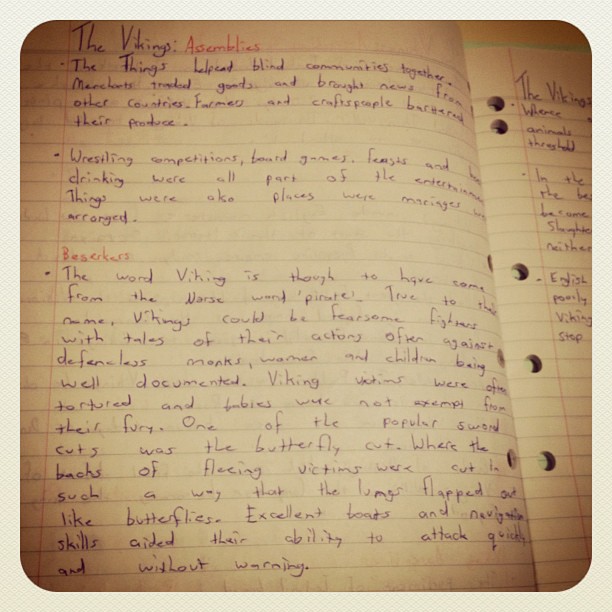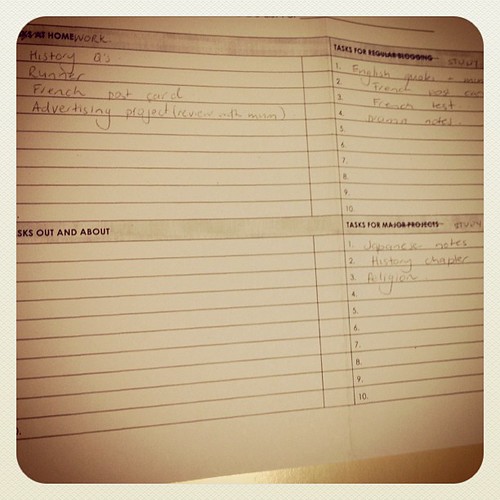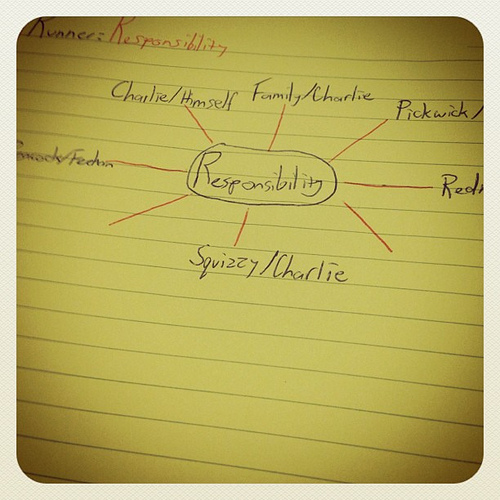At the start of June our 13 year old will sit his second round of mid year exams (he is in year 8). His study skills have improved since his first go last year, but something I realised this year was that while they do some work at school with the kids, I really needed to spend some time with him teaching him study skills.
I am not a teacher, nor an academic so what I am sharing are simply strategies I have used with my son to teach him better study skills and some resources we have found helpful.
Note Taking
In my post last year on 10 Things I Have Learnt About Year 7 And Year 7 Boys This Year I highlighted how our son could himself see there was room for improvment in the way he studied for his exams.

His goal this year was to have all his notes up to date a few weeks before the exams start. To his credit he did start writing notes up in a special study note book in term 1. When he showed me his notes, I instantly saw that the notes themselves where part of the problem.
His notes where really just slabs of text he was taking from his class notes or text book. They were not at all user friendly and nor did they appeal to his learning style.
His school subscribes to the Study Skills Handbook so I had him go back and review the online units about note taking. Once he finished it we then talked about the key criteria for taking good study notes:
- Dot points – do not write in paragraphs! Dot points are best and the shorter the better.
- Key points – focus on key words and definitions.
- Simplify – can it be made into a timeline? a table? a chart? Try and make it visually simple, so you can use the image to help with recall.
- Colour code – use different colour pens or highlighters consistently throughout your notes. Eg all dates in red, info you know will be tested highlighted in yellow.
- Use your own words – you are more likely to remember information when the terminology is something you would actually use and you understand it.

We had a real break through with this and he went back and redid all the history notes he had written in a more user friendly format.
Taking his learning style into account
Early in term two his teacher took the class through the different learning styles and assessed each child. Our son is a predominantly kinesthetic learner, meaning he actually learns better when he is moving his body and being physically active with this learning.
He is a constant tapper, jigger, swinger of chair type of kid – which does sort of drive me crazy sometimes! But I see how it works for him and I have tried to help him find ways to study that is less passive and a range of mediums to prevent the “boring” factor.

In Japanese for example, I had him create a table that he could write in. It took a number of goes at the table before he could recall all the appropriate answers. After each table, he would rewrite a number of times the answers he had incorrect or didn’t know. He was very happy with the improved test results he received when he used this technique for a class test.
I also found an online resource where he could test himself on the Katakana he needed to know. Youth Central have a great page on their site on Study Tips which includes a link to a quiz where you can work out what type of learner you are.
Remove distractions
Once we reached about a month out before these set of exams, we reassessed our son’s technology use / tv watching. Like me, he loves technology and could easily spend lots of time on it. Until exams are over, he has technology only on Friday, Saturday and Sundays and only after a minimum amount of homework has been completed.
While he did not love this decision, he conceded that combined with his sporting activities, he did need to use his time better.
Study Timetable
I did get him to set out a study timetable from that point right up until the exam period. He dutifully went off and created a spreadsheet and filled it in. I actually don’t think he has looked at it since! I simply don’t think he can work that far out. So we have tried something new, a more week by week approach and he seems to feel more comfortable with this.
I had him write a list up of:
- All the homework that needed to be completed.
- The gaps in his study notes.
- Any upcoming tests.
- Due dates for assignments.

The first time we did this on a Friday night, I helped him then schedule the workload over the weekend. He now feels like he will be able to do it himself next week.
I am going to check in with him Sunday evening to see how he has traveled with his to do list. I still do find he needs to know this will happen to keep him accountable!
I also try to remember what I was like at his age. As planned as I am now, I was a massive last minute study type of person. Studying is a skill and at the moment I am trying to teach some skills that he will be able to consolidate on as exams start to become of more importance to his education.
Are you in the lead up to exams at the moment with any of your kids? How do you help teach them study skills?

